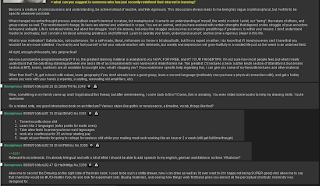Having been quite an introspective person naturally I began reading into how to improve cognition, basically make my mind more efficient. The main method through both experience and 'fact' is meditation (I use the term fact loosely as its in part borderline 'pseudo-scientific' claims and theories). I could rant and rave all day about the therapeutic benefits of mediation but this is a blog about computing so I'd recommend you to have a look up yourself, I think it helps sort your head out in all kinds of good ways.
Back to the topic at hand, human reasoning errors, what I mean by this is how we make those super fast judgements and find alot of them to be massively wrong and some of them to be completely correct, with no seeming order to this process. So I went on an internet adventure exploring what is really going on when these weird processes happen with no seeming conscious control. It turns out conveniently enough that the mind is very similar to a computer in that it stores data based on past experience and relays them automatically to fit similar situations in the present. Sometimes this saves time sometimes it doesn't. This process is labelled under a subject known as Heuristics.
Incredibly interesting article explaining the reasoning behind heuristics and cognitive biases;
A quick summary from this article; essentially the human brain has so much sensory input to handle that it has its own coping mechanisms which aid it in its daily function. The mechanisms are based, so we believe, on a kind of complex association system in which a certain action (e.g opening a door) is stored in the long term memory and when a similar scenario is encountered again for example reaching another door, the mind automatically assumes that this door must be like the 'door' object of previous encounters so the same principles are assumed to apply and the same action is therefore executed. Whilst this system is very economical and efficient it obviously has numerous limitations.
An example demonstrated in the text is 'a group of people asked to work out a sum by way of a 5second guesstimate .The example shows just how we will engage our brains to apply previous rules and assumptions to the problem.
The Question:
Consider the product of the series:
9 x 8 x7 x 6 x 5 x 4 x3 x 2 x 1 = ?
vs.
1 x 2 x 3 x 4 x 5 x 6 x 7 x 8 x 9 = ?
The typical answers:
9*8*7*6*5*4*3*2*1 'usually comes out at an average of 4000'
however,
1*2*3*4*5*6*7*8*9 'usually comes out at around 500'
The actual answer is
362,880.
This very basic example shows just how the association function is sometimes limiting and how easy it is to engage it.
The article also explains the different categories of heuristic failure and when and how they are limiting. Examples such as logic assumptions and ignorance to statistics due to emotive association (terrorism vs cancer).
Worth a re-read every now and then to avoid problem solving genercism as it will occasionally be defeatist.
Shown below is the cognitive process by which people are encouraged to avoid bias.
If this doesnt make immediate sense, consult your mind in an introspective manner, or read the article














